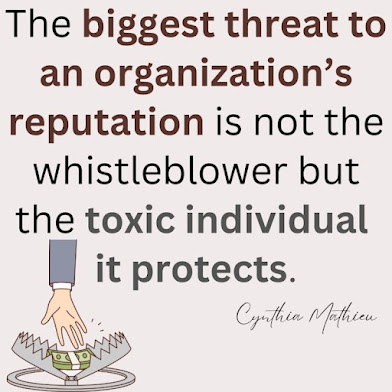...Stein (2003) suggests that extreme organizational narcissism will possess and behave according to five principles. First, members will believe that the organization is extraordinarily special and unique, to the point of delusion. Second, the organization will be characterised by an all-powerful sense of entitlement and anything of potency will be felt to legitimately belong to it. Third, the organization will be convinced of being omniscient. It will believe to have access to all internal and external information relevant to the organization. Fourth, the narcissistic delusion of the organization will lead it to be dismissive of other organizations, people and information and treat them with triumphant contempt. Fifth, these attributes become pervasive to the point of permanently taking over all organizational functioning (Stein, 2003).
The problem with this adaptive strategy is that it may offer short-term gratification to the individual/organization embracing it, but wreaks havoc among the individuals used as mirrors to reflect the narcissists’ false and idealised self (Campbell & Campbell, 2009). Moreover, this strategy is not sustainable and demands increasing resources. In its eagerness to gain visibility and recognition in the marketplace, the organization over engages in self-reflection, at the expense of the full range of organizational stakeholders and public opinion’s expectations (Hatch & Schultz, 2002). When the ideal self is inevitably challenged (by arising problems, etc.), truth or compromise are not the priority of the narcissist/narcissistic organization, instead, the maintenance of a positive self-image is the priority, and if necessary, the narcissist/narcissistic organization lies, deceives and socially manipulates to maintain the internal status quo (Pincus & Roche, 2011). As maintenance of the idealised self is based on deceit and covert manipulation, it is extremely difficult to contain these toxic behaviours whilst they are enacted, until they reach catastrophic proportions (Vazire & Funder, 2006)...
...In a working environment where claimed core values revolve around mutual trust and credibility, narcissistic behaviours can be enacted whilst taking advantage of these beliefs. Workplace bullying is a common behaviour for individuals chronically incapable of feeling empathy in work contexts. The perpetrator does not understand other people’s subjectivity and cannot help but victimize his/her interlocutor when frustration runs high, thus abuse becomes a possible means to achieve goals (Misawa & Rowland, 2015). The strongly hierarchical structure of academia and the highly dependent relationships between senior staff and junior academics allow the practice to go unnoticed and discourage its reporting and mitigation, due to concerns of possible damage to the reputation of the institution (Mahmoudi, 2019)...
From: https://link.springer.com/article/10.1007/s10805-022-09456-2







